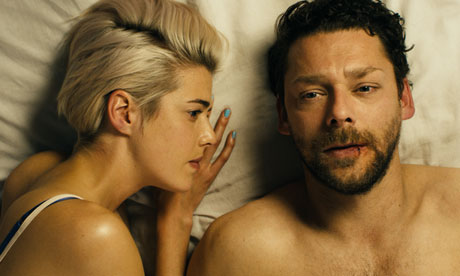Pusher – review

Richard Coyle with Agyness Deyn in Pusher
“I’m like a boomerang, I always come back,” promises Frank, protagonist and small-time drug pusher, in Luis Prieto’s tale of dope, doe-eyed strippers and destruction. The same could be said for Pusher itself, which after a 1996 original and two sequels is back, again, for a remake.
This time around, the crime drug spree plays out in the wedding dress shops, strip clubs and sweaty spas of London’s East End. Mainly shot around Stoke Newington, the film is produced by Nicolas Winding Refn who was behind the directorial wheel of Drive and the original Pusher.
The remake’s clock revolves around a familiar 7-day countdown. Day by day we’re left to helplessly watch the inevitable downfall of Frank, played by Richard Coyle (of Coupling fame). By way of a police bust and a dodgy batch of drugs, Frank’s debts rack up interest faster than a wonga.com account. And before long he owes £55,000 to Serbian drug lord Milo, who is threatening to rip off his kneecaps.
So far, nothing new. And the film’s formula doesn’t do much to subvert our expectations of a Guy Ritchie-esque plot unfurling. If you’re looking for a does-what-it-says-on-the-tin drugs yarn, then this will probably tick your boxes. Prieto creates a world of zebra carpeted strip clubs where baseball bats are conveniently kept under bars. There’s torture (nipple electrocution), blue-lit cocaine binges in loos and blood splattered on a white bunny rabbit.
The main problems lie in the emptiness of the characters’ relationships. Frank’s girlfriend Flo (played by British model-turned-actress Agyness Deyn) fights for his attention and their relationship. Agyness hung out with a woman who worked at Browns in Shoreditch to research the role and make sure she had her pole dancing nailed. And it shows. Cavorting round a pole in a red wig, she does her best to capture the fragile Flo. (Not quite as good as Natalie Portman’s pink-wigged pole dance in Closer, but that’s a tough act to follow.)
Yet even with the pole shimmying, Agent Provocateur undies and some writhing around having heroin orgasms in a bathtub, Flo doesn’t manage to get Frank’s attention. There’s little chemistry between the two lovers and it’s difficult for an audience to feel invested in their relationship, when it feels so limp.
Perhaps, this has something to do with Frank himself, who we’re never really rooting for. Given the amount of screen time he has, it’s a shame he couldn’t do more to win us over. Maybe if he hadn’t beaten Tony – his likeable buffoon of a sidekick – to a pulp so early on, then the writers could have explored their relationship, and created more empathy.
Nonetheless Orbital’s pulsing soundtrack and the stylised finish do their best to paste over the screenplay’s cracks.
By the end of the week, Frank’s time is up. He’s stripped of his watch, car and woman, and is left with nothing. The thing is, by that stage do we really care? Not enough.
